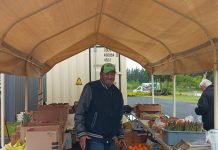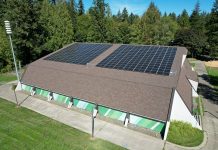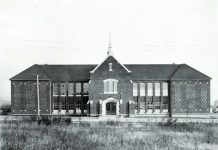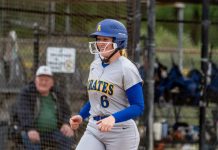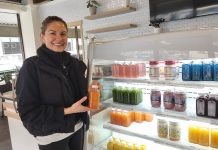Although classrooms on campus remain empty during this unprecedented time, spring quarter instruction is in full swing at The Evergreen State College. Professors and students now convene remotely using Zoom, and students access research materials and library support via email. Evergreen is working hard to close the digital divide. To ensure every student has equal access to their professors and the resources necessary to complete coursework, Evergreen is loaning nearly 350 newly obtained Chromebooks to students who typically use a library computer to write essays and do research.
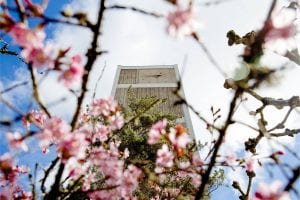
Over 80 percent of Evergreen students come from one or more historically disadvantaged or underserved populations. Over 50 percent come from families considered low income. The office of Therese Saliba, interim vice president of inclusive excellence and student success, is working hard to support these students at a time when their learning routines have been disrupted.
“In times of crisis, inequalities become more pronounced,” Saliba explains. Her goal is to make sure underserved students are supported through the inequalities produced by the COVID-19 crisis. Her team of staff advisors does this through kind, consistent outreach. They are checking on these students through regular emails and phone calls to be sure they have what they need in terms of their education and their basic everyday lives. Saliba is grateful for donations from the Library and President’s Equity Fund that made the bulk purchase of the Chromebooks possible.
Fifty Chromebooks were reserved for students enrolled in TRiO Student Success, a federally funded program devoted to supporting first-generation, low-income and/or disabled students in their journey toward a bachelor’s degree. Fifty Chromebooks were taken to Evergreen’s Tacoma campus to ease access for students in Pierce County. The remaining Chromebooks were available for pick up at the Olympia campus’s library over the course of four days. Distribution is considered essential to maintaining online learning and is supported in the governor’s recent directive. Pick up hours were spread over four days to ensure all social distance guidelines were adhered to.
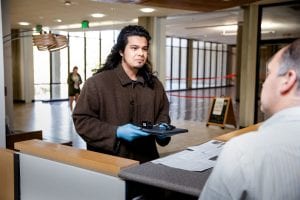
By providing a Chromebook to students who depend on the campus’s public computers, Evergreen is ensuring these students do not have to attend class and complete coursework on their smartphones or other unsuitable devices. Chromebooks were a cost-effective equipment choice. They allow students to access Zoom so they can attend class remotely, as well as essentials like a web browser and a word processing application. They’re set up so it’s difficult to download games and other software onto them.
Ahniwa Ferrari is Evergreen’s Associate Dean for Library Operations. In addition to coordinating the distribution of the Chromebooks through the library, he leads a team of staff now tasked with helping students obtain digital copies of their course materials wherever possible. To date, the library typically provided print copies of most materials and has had to pivot quickly to electronic access.
Now that the circulation of physical media has stopped completely, Ferrari and his team are working hard to secure digital media such as e-books for any resource a student requests. In some cases, electronic media costs more than a hard copy. In cases where the library is unable to provide resources, the financial aid office helps low-income students cover unexpected costs.

Evergreen’s spring break was the last full week of March. Greg Mullins, Evergreen’s dean for instructional support and library and media services, expresses how fortunate that timing was in terms of the campus’s COVID-19 response. Although the governor’s mandated closures had shuttered the campus prior to that week, spring break’s designated week of no instruction allowed faculty and staff to make a game plan for remote learning upon the students’ return. They worked quickly to source the Chromebooks and mobilize workshops for faculty on remote instruction technology.
Mullins, Ferrari and Saliba are all pleased to report that feedback from the student body has been extremely positive. Students were surveyed in the second week of April in an effort to unearth deeper problems. Many reported feelings of disconnectedness and disorientation during spring break. Returning to classes, even remotely, has given them a sense of normalcy and togetherness that disappeared during the last week of March. “They’re back in their learning communities and they’re focused,” says Mullins. The distribution of Chromebooks ensures no student will be left out of the community’s evolving learning methods.
One of the greatest challenges Mullins sees is also a strength: “Evergreen is very decentralized.” Because Evergreen’s learning model empowers every student to tailor their own educational experience, the academic needs of each individual vary widely. It becomes a disadvantage when students need specific materials and resources to complete their projects that they may no longer know how to access. This is why outreach on the part of Advisors and responsiveness on the part of the Library team has become so critical.
The “decentralized” nature of Evergreen’s learning community makes it what Saliba refers to as “nimble.” Students, faculty, and staff are collaborating remotely to be creative and find innovative solutions to keep students on track with collective goals and individual projects. “There’s been a burst of creative energy,” says Mullins. While connectedness and resource access may be difficult for some institutions to maintain during the COVID-19 crisis, Evergreen is well equipped both intellectually and technologically to meet the challenge.
For more information on classes, visit The Evergreen State College.
Sponsored





